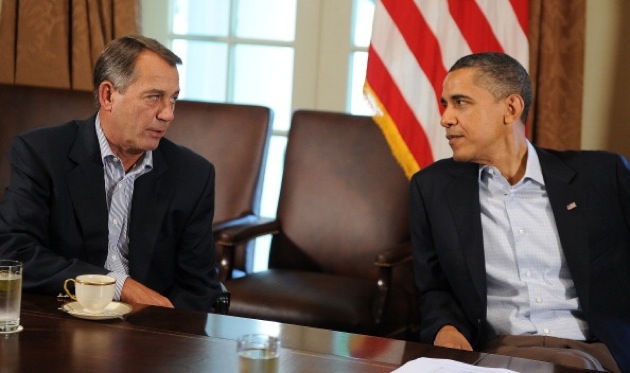As the debt ceiling fiasco continues unresolved and increasingly dangerous, with no agreement among the House, the Senate and the White House yet in sight, an obscure and forgotten constitutional clause has suddenly come under scrutiny. The Fourteenth Amendment, adopted after the Civil War, provides that “The validity of the public debt of the United States, authorized by law … shall not be questioned.” Does that clause mean that it is unconstitutional for Congress to refuse to raise the debt ceiling – the amount the nation is legally permitted to borrow – in our present circumstances, and that the President is therefore constitutionally permitted to borrow money on his own authority? The present Congressional authority will expire on August 2; it is far from certain what will happen to our economy if that authority is not extended before then. It seems very likely, however, that if the President does not then act on his own the nation will default on its treasury bonds and other solemn legal obligations, including payments due millions of citizens under Social Security.
The “debt shall not be questioned” clause was added to the Fourteenth Amendment for a specific and immediate purpose: to prevent the new Southern members of Congress, should they gain a majority, from cancelling the debt the Union had incurred in the war. But constitutional interpretation is not a catalogue of historical anecdotes; it is a matter of principle and we are therefore required to identify the principle on which the authors of the clause had to rely. As Chief Justice Hughes said of the clause in 1935, speaking for a unanimous Supreme Court, “While this provision was undoubtedly inspired by the desire to put beyond question the obligations of the government issued during the Civil War, its language indicates a broader connotation. We regard it as confirmatory of a fundamental principle … ”
The general contours of that fundamental principle seem clear enough. Congress does not have authority, even by a substantial majority, to dishonor the nation by repudiating outstanding debts it has authorized the nation to incur. The fiscal integrity of the United States is sacred and requires constitutional protection. Does that principle apply to the debt ceiling crisis?
Of course the principle does not prevent Congress from refusing to authorize new obligations. Obviously, Congress may modify or even extinguish the Social Security or Medicare programs prospectively. But the Republican majority in the House now refuses to permit the country to meet debts duly authorized in the past that remain duly authorized now, unless the Democrats and the President agree to a radical reduction in essential public services that they would never otherwise accept. That is playing blackmail with the nation’s honor. It threatens exactly the kind of forced default that the principle behind the debt clause declares it has no authority to inflict. I believe the best, principled, interpretation of the clause gives the president authority to ignore that blackmail and to borrow enough to meet the nation’s standing legal obligations.
Many academic and other constitutional lawyers agree, and even Senator Chuck Grassley, a conservative Republican, says that this constitutional argument cannot be dismissed. However, Professor Lawrence Tribe of the Harvard Law School, a very distinguished constitutional lawyer, disagrees. He writes that the argument I have just endorsed proves too much. “It would mean that any budget deficit, tax cut or spending increase could be attacked on constitutional grounds, because each of those actions slightly increases the probability of default.” But I believe Professor Tribe has confused the principle I describe with a different one: that Congress lacks authority to make any decision that might decrease the nation’s treasury and so make national default “slightly” – even if only theoretically – more likely. This would indeed be absurd. But the Republicans now threaten action that they know would make default inevitable: indeed that inevitability is essential to their blackmail strategy. That violates the very different principle I described and that Chief Justice Hughes had in mind: it claims Congressional authority knowingly to make it legally impossible for the nation to act honestly.
Of course it is an entirely different question whether it would be politically wise for the President to rely on the “debt” clause of the Fourteenth Amendment to ignore Congress’s failure to extend the debt ceiling. Obama has said that he has “talked to my lawyers” and “they are not persuaded that [relying on the debt clause] is a winning argument.” That is a careful statement. It does not say that either his lawyers or he are persuaded that it is not a winning argument, and of course there is a difference between a “winning” argument, which means one a court would probably accept, and a “correct” argument that he himself could honestly endorse.
Advertisement
Some Republicans have declared that if the President does accept the constitutional argument, and acts without their consent, they will try to impeach him. That would take only a majority of the House, which the Republicans control. Impeachment would be a tragedy because, even though the Democratic Senate would certainly refuse to convict, the process would waste a huge amount of the President’s time at a crucial and difficult moment of our history. But surely even the Tea Party representatives can understand that they would make fools of themselves by declaring that a president is guilty of “a high crime or misdemeanor” whenever he interprets the Constitution in a way they believe wrong, particularly when a substantial number of the nation’s lawyers agree with him.
One enormous consequence of the shaming national disgrace we are now enduring will not be known until November of 2012. But I doubt very many now uncommitted voters would disapprove of a president who acted under a reasonable interpretation of the law to allow the government payments on which they rely to continue, and to prevent damage to our international credit that would inevitably increase their taxes and might well eventually savage their standard of living.



